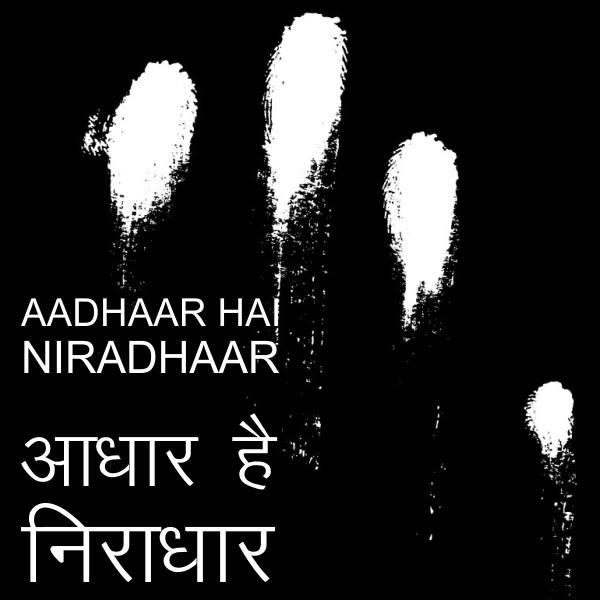Radheshyam Jadhav |
Tembhli (Nandurbar): |
It’s 2.30pm and after hectic hunting for work all morning, Ranjana Sonawane, a daily wage worker, has returned to her hut. She lights a chulha to prepare a quick meal for her family, and within a few seconds, is enveloped in the smoke billowing out. In her ramshackle home, there is no cooking gas, no toilet and no electricity . And after demonetisation, she can’t find work and has no money .But she has a unique identity. She is the first Indian to get an Aadhaar card, which was meant to help her and others like her get better access to government schemes and facilities like banking and insurance.
“I am finding it difficult to survive,“ says Ranjana, who doubles up as a daily wager and sells toys at village fairs.“Getting work has become ve ry difficult because farmers say they are not getting cash from banks and, can’t give us work and wages. I wanted to go to the Sarangkheda fair to set up a toy shop, but couldn’t because I have no money to travel,“ she says.
Ask Ranjana about the Modi government‘s cashless economy plan, and she says with a grin, “We are already cashless. See our empty bank passbooks. We don’t have cash. The government can declare Tembhli the first cashless village. The previous government made us the first Aadhaar village.“
No one from this village queued up to deposit demonetised currency notes in the nearest banks in Shahada town, about 10km away-they didn’t have Rs 500 or Rs 1,000 notes to exchange or deposit. Most transactions here take place in small denominations of Rs 50 and Rs 100. Wiping off the dust on a laminated frame with her pallu, she shows us the photograph that was taken when Congress chief Sonia Gandhi and then Prime Minister Manmohan Singh descended on the village in 2010 to launch the Aadhaar project.
“In 2010, netas handed over the Aadhaar card to me and other villagers, clicked photos and went away . Nobody has even bothered to ask us what happened after that. My electricity meter was taken away and the bank account connected to Aadhaar remains empty .I’ve not got any subsidy deposited in my account till date. The previous government gave this useless Aadhaar card and this government has taken away our roji roti (work) by scrapping currency notes.“
The government had chosen Tembhli in Nandurbar district in north Maharashtra, about 400km from Mumbai, to launch the Aadhaar project because Sonia Gandhi had held one of her first public rallies af ter joining politics in Nandurbar in 1998. It was a moment of glory but one which constantly reminds Tembhli of unfulfilled promises. “The government then (UPA) built a concrete road overnight while this government has scrapped currency notes in a single day . The road has developed cracks because it was a hasty decision. I hope demonetisation doesn’t meet the fate of this road,“ says Azad Thakre, pointing at the crumbling road.
Intervening in the conversation, zilla parishad teacher Nana Koli introduces Azad as the village deputy sarpanch.Azad unsuccessfully tries to cover up his muddy , torn shirt by draping a towel over his shoulders. After another futile attempt, he removes the towel and ties it around his waist. Azad himself has remained without daily wages for days and wants to meet CM Devendra Fadnavis to tell him about the woes of the locals.
As some villagers gather in a lane where water is overflowing from an open drain on to the road, others peep through the crevices of grass huts. Panchayat member Vimlabai Marathe rummages through a wooden cupboard in her hut and comes out flashing her Bank of India passbook.
Ask her if she has stood in a bank queue to withdraw money, and she shows us the empty columns in her passbook: “We work and earn on a daily basis.What will we deposit in banks.“
The village predominantly comprises Bhil tribals, many of whom work as farm labour.They travel to nearby towns in Gujarat as daily wage workers when it’s time for sowing or harvesting though nowadays there is little demand for workers on farms.
Vishal Pawar, sitting in his dingy grocery shop, says everyone is purchasing on credit.“But I am a small shopkeeper and even I need money to buy material,“ he says. Vishal is in the dark about mobile banking and online or card payments.
Tembhli’s villagers do not fully understand demonetisation and are upset that it’s affected their lives, but they have heard that the government has done this for the poor. “The Modi government has scrapped big currency notes to punish the rich. Modi will collect black money from them and use that for the poor. The Prime Minister must start this scheme from our village, rather from me,“ says Ranjana.
“There is no harm in being hopeful. It is hope that keeps us going,“ she says, adding she has a dream to live in a concrete house with electricity , gas and toilets, and wants to open a small cutlery shop.



December 30, 2016 at 5:23 pm
The experiences of the woman show the apathy of politicians in dealing with people. The village and Ranjana, the first aadhar card indian have been neglected after the media glare for a couple of days. Now, their ‘cashless’ sufferings are not being addressed